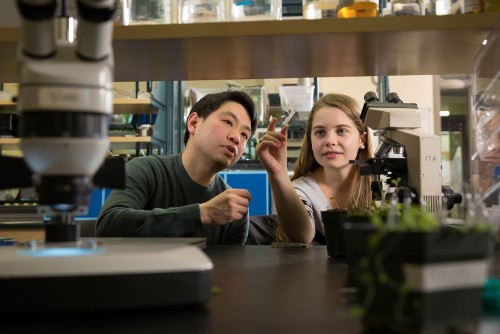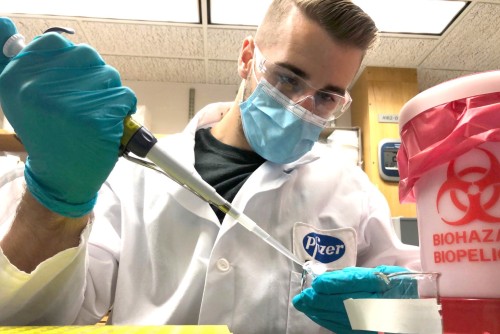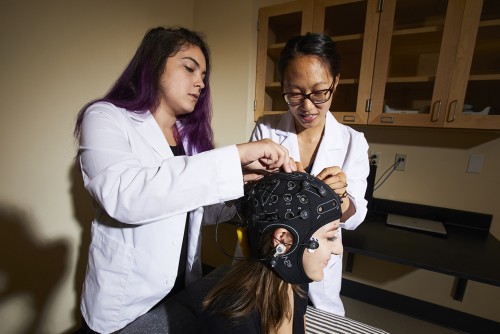The Role Model and Mentor Behind Countless Successful Science Careers
For more than 20 years, Dr. Marsha A. Moses ’75 has welcomed Stonehill science students and grads to her Boston Children’s Hospital lab. The impact has been profound.
They are now biologists, chemists, academics, clinicians and industry leaders.
There’s a biotech co-founder and a graduate student in chemical biology at Scripps Research; a surgeon practicing at Southern Maine Health Care Medical Center; a resident training in family medicine at UMass Chan Medical School and another in surgery at Walter Reed National Military Medical Center.
What unites these alumni, beyond their bachelor’s degrees and a calling to science? They are among the scores of Stonehill students and graduates who have discovered transformational mentorship in the laboratory of Dr. Marsha A. Moses ’75.
A member of the College’s Board of Trustees and the Chair of its Academic Affairs Committee, Dr. Moses is the Julia Dyckman Andrus Professor of Surgery at Harvard Medical School and the Director of the Vascular Biology Program at Boston Children’s Hospital. Before establishing her own cancer research lab, she earned a Ph.D. in Biochemistry from Boston University and then conducted her post-doctoral research at MIT and Boston Children’s Hospital. But first, she began her education on the campus of Stonehill.
During Moses’ senior year, she completed an independent study with Biology Professor Sandra McAllister, an experience that both affirmed an interest in biology and chemistry and fueled her belief that a fulfilling career in science was possible.
“Here was this accomplished professor, a woman, who was conducting research and teaching the hard sciences, giving me my first chance to spend time working independently in a research lab,” says Dr. Moses. “That was when I truly fell in love with scientific research. Professor McAllister was a revelation for those of us who took her courses and realized that we, too, could become academic scientists.”
Hard Science and Soft Skills
The time in Professor McAllister’s Stonehill courses and labs left a permanent impression on Dr. Moses. Once she found her own name on a laboratory door, she resolved to open it to current Stonehill students in kind. “In my experience, I had to ‘see it to be it’” she explains. “Once I was running my own lab, it was clear how many opportunities I could unlock for students by hosting and mentoring them here.”
Over two-plus decades, Dr. Moses’ mentorship of Stonehill students and alumni has developed organically and taken shape in different ways, from hosting full-semester internships to lab visits and to even hiring many former students for full-time jobs post-graduation.
Notably, Dr. Moses ensures her mentees’ lab time is well-spent on “meaningful” work: running experiments, curating the lab’s tissue bank, collecting samples, attending lab meetings — even being included in published research. Students go on to their chosen next step with a robust curriculum vitae reflecting experience within a preeminent academic research lab.
Dr. Cassandra Daisy ’18, the family medicine resident at UMass Chan Medical School, applied to medical school with a first author study on potential sports-related concussion biomarkers already published in a peer-reviewed journal. She says her time in Moses’ Lab gave her invaluable experience; it also gave her the confidence to trust her gut. “Dr. Moses trusted me to make decisions,” she says. “Even when I made a different one than she may have made, she helped me learn from it and try again.”
Biology major Stephen Cobbs ’23 says Dr. Moses’ support and mentorship have had a profound impact on him and his career path.
Mentorship Comes Full Circle
Biology major Stephen Cobbs ’23, one of the newest Stonehill graduates to join Dr. Moses’ lab, recognizes the intrinsic value of the opportunities he’s found there. “Mentorship is imperative to research,” he says. “I truly would not be here today without the mentors I found within the Stonehill community.”
He and many of her other mentees seek Dr. Moses’ ongoing career advice; all say she helped them solidify their scientific and clinical interests and gain clarity on their next steps. Once Rama Aldakhlallah ’20 began working with Dr. Moses as a lab technician who among other things supported the research being conducted on the lab’s obesity and breast cancer initiatives — she discovered life at the lab was “even better” than she expected.
With Dr. Moses’ support, she completed Harvard Extension School courses and then applied to the graduate program in chemical biology at Scripps. She hopes to one day be the principal investigator of her own lab, researching, teaching—and, of course, mentoring. “I was so lucky to have Dr. Moses as a role model. She’s inspired me to want to do the same for others,” Aldakhlallah says.
That “paying it forward” sentiment reflects Moses’ original commitment to mentorship born from her Stonehill education. The role comes naturally to Dr. Moses, who has been recognized with numerous mentorship awards from Boston Children’s and Harvard Medical School. “I can give these students access to extraordinary research scientists, clinicians and experiences,” she says. “So of course I do—and in return, they always make me proud.”
Rama Aldakhlallah ’20 credits Dr. Moses with inspiring her to pursue a path that hopefully will one day allow her to be the principal investigator in her own lab.
Prioritizing Patients in Research
Dr. Moses also ensures that mentees never lose sight of the ultimate beneficiary of their work: patients. “She taught me to always think of the bigger picture,” Daisy says. “Although it would be many years until a patient could benefit from our work, Dr. Moses is always thinking about what is best for a patient.”
That patient-first focus is critical for physicians-in-training, adds Dr. Adelle Dagher ’13, the resident at Walter Reed. “Dr. Moses’ lab is a basic science lab that is very translational, so I had the opportunity to collaborate with clinicians,” she says. “Although my day-to-day job now doesn’t involve injecting mice with tumor cells, having a more robust scientific background certainly impacts how I think about disease processes and treatments.”
Eric Schott ’13, a co-founder of the biotech company Solarea Bio, said he was grateful to have Dr. Moses guide him in his development as a scientist and to be part of a Program founded by legendary surgeon/scientist.
For former intern Eric Schott ’13, the cutting-edge research being conducted in the Moses lab along with the history of Dr. Moses’ Program — it was founded by legendary surgeon/scientist Dr. Judah Folkman, who established the field of angiogenesis research—were both inspiring. “It was incredible to understand the history of this profound research that has taken place there and impacted a lot of lives,” he notes.
After completing his Ph.D. at the University of Rochester School of Medicine, Schott parlayed his clinical research interests into a therapeutic idea as co-founder of the company Solarea Bio. He says Dr. Moses encourages an entrepreneurial spirit among her mentees. “While working with Dr. Moses, I learned to independently seek answers by asking the right questions and to step outside the box in my thinking,” he says.
Related
-
Biology Major & Minor
The Stonehill Biology program prepares students for life sciences graduate programs and professional programs in medical, allied health and environmental fields. It also prepares graduates for direct entry into the workforce.
-
Team Vaccine
In a poignant reflection of Stonehill’s mission, a number of students and alums are putting their degrees to work in the race for a COVID-19 vaccine.
-
Stonehill Undergraduate Research Experience
Guided by passion and curiosity, Stonehill students reach beyond the boundaries of traditional classroom learning to engage in significant undergraduate research with expert faculty.


